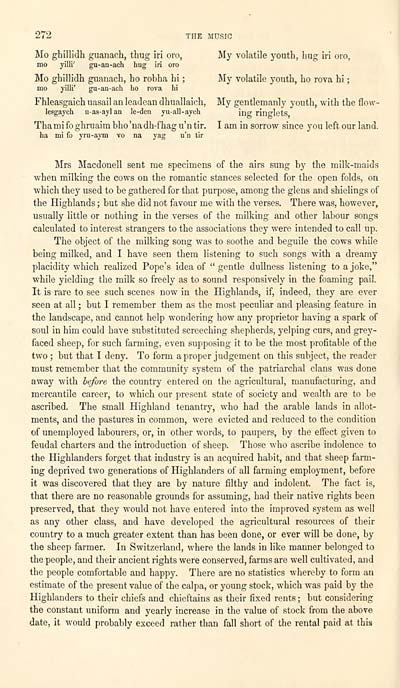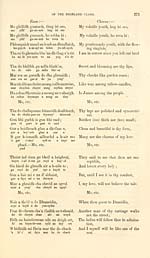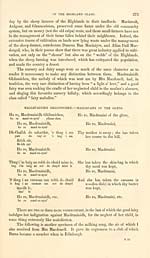Download files
Complete book:
Individual page:
Thumbnail gallery: Grid view | List view

272 THE MUSIC
Mo ghillidh guanach, tliug iri oro, My volatile youth, hug iri oro,
mo yilli' gn-an-ach hug iri oro
Mo ghillidh guanach, ho robha hi ; My volatile youth, ho rova hi ;
mo yilli' gu-an-ach ho rova hi
Fhleasgaich uasail an leadean dhuallaich, My gentlemanly youth, with the flow-
u-as-aylan le-den yu-all-aych ing rinflets
Thamifoghruaimbho'nadh-fhagu'ntir. I am in sorrow since you left our land.
ha mi fo yra-aym vo na yag u'n tir
Mrs Macdonell sent me specimens of the airs sung by the milk-maids
when milking the cows on the romantic stances selected for the open folds, on
which they used to be gathered for that purpose, among the glens and shielings of
the Highlands ; but she did not favour me with the verses. There was, however,
usually little or nothing in the verses of the milking and other labour songs
calculated to interest strangers to the associations they were intended to call up.
The object of the milking song was to soothe and beguile the cows while
being milked, and I have seen them listening to such songs with a dreamy
placidity which realized Pope's idea of " gentle dullness listening to a joke,"
while yielding the milk so freely as to sound responsively in the foaming pail.
It is rare to see such scenes now in the Highlands, if, indeed, they are ever
seen at all ; but I remember them as the most peculiar and pleasing feature in
the landscape, and cannot help wondering how any proprietor having a spark of
soul in him could have substituted screeching shepherds, yelping curs, and grey-
faced sheep, for such farming, even supposing it to be the n:ost profitable of the
two ; but that I deny. To form a proper judgement on this subject, the reader
must remember that the community system of the patriarchal clans was done
away with before the country entered on the agricultural, manufacturing, and
mercantile career, to which our present state of society and wealth are to be
ascribed. The small Highland tenantry, who had the arable lands in allot-
ments, and the pastures in common, were evicted and reduced to the condition
of unemployed labourers, or, in other words, to paupers, by the effect given to
feudal charters and the introduction of sheep. Those who ascribe indolence to
the Highlanders forget that industry is an acquired habit, and that sheep farm-
ing deprived two generations of Highlanders of all farming employment, before
it was discovered that they are by nature filthy and indolent. The tact is,
that there are no reasonable grounds for assuming, had their native rights been
preserved, that they would not have entered into the improved system as well
as any other class, and have developed the agricultural resources of their
country to a much greater extent than has been done, or ever will be done, by
the sheep farmer. In Switzerland, where the lands in like manner belonged to
the people, and their ancient rights were conserved, farms are well cultivated, and
the people comfortable and happy. There are no statistics whereby to form an
estimate of the present value of the calpa, or young stock, which was paid by the
Highlanders to their chiefs and chieftains as their fixed rents ; but considering
the constant unifonn and yearly increase in the value of stock from the above
date, it would probably exceed rather than fall short of the rental paid at this
Mo ghillidh guanach, tliug iri oro, My volatile youth, hug iri oro,
mo yilli' gn-an-ach hug iri oro
Mo ghillidh guanach, ho robha hi ; My volatile youth, ho rova hi ;
mo yilli' gu-an-ach ho rova hi
Fhleasgaich uasail an leadean dhuallaich, My gentlemanly youth, with the flow-
u-as-aylan le-den yu-all-aych ing rinflets
Thamifoghruaimbho'nadh-fhagu'ntir. I am in sorrow since you left our land.
ha mi fo yra-aym vo na yag u'n tir
Mrs Macdonell sent me specimens of the airs sung by the milk-maids
when milking the cows on the romantic stances selected for the open folds, on
which they used to be gathered for that purpose, among the glens and shielings of
the Highlands ; but she did not favour me with the verses. There was, however,
usually little or nothing in the verses of the milking and other labour songs
calculated to interest strangers to the associations they were intended to call up.
The object of the milking song was to soothe and beguile the cows while
being milked, and I have seen them listening to such songs with a dreamy
placidity which realized Pope's idea of " gentle dullness listening to a joke,"
while yielding the milk so freely as to sound responsively in the foaming pail.
It is rare to see such scenes now in the Highlands, if, indeed, they are ever
seen at all ; but I remember them as the most peculiar and pleasing feature in
the landscape, and cannot help wondering how any proprietor having a spark of
soul in him could have substituted screeching shepherds, yelping curs, and grey-
faced sheep, for such farming, even supposing it to be the n:ost profitable of the
two ; but that I deny. To form a proper judgement on this subject, the reader
must remember that the community system of the patriarchal clans was done
away with before the country entered on the agricultural, manufacturing, and
mercantile career, to which our present state of society and wealth are to be
ascribed. The small Highland tenantry, who had the arable lands in allot-
ments, and the pastures in common, were evicted and reduced to the condition
of unemployed labourers, or, in other words, to paupers, by the effect given to
feudal charters and the introduction of sheep. Those who ascribe indolence to
the Highlanders forget that industry is an acquired habit, and that sheep farm-
ing deprived two generations of Highlanders of all farming employment, before
it was discovered that they are by nature filthy and indolent. The tact is,
that there are no reasonable grounds for assuming, had their native rights been
preserved, that they would not have entered into the improved system as well
as any other class, and have developed the agricultural resources of their
country to a much greater extent than has been done, or ever will be done, by
the sheep farmer. In Switzerland, where the lands in like manner belonged to
the people, and their ancient rights were conserved, farms are well cultivated, and
the people comfortable and happy. There are no statistics whereby to form an
estimate of the present value of the calpa, or young stock, which was paid by the
Highlanders to their chiefs and chieftains as their fixed rents ; but considering
the constant unifonn and yearly increase in the value of stock from the above
date, it would probably exceed rather than fall short of the rental paid at this
Set display mode to: Large image | Transcription
Images and transcriptions on this page, including medium image downloads, may be used under the Creative Commons Attribution 4.0 International Licence unless otherwise stated. ![]()
| Early Gaelic Book Collections > Blair Collection > Treatise on the language, poetry, and music of the Highland clans > (284) |
|---|
| Permanent URL | https://digital.nls.uk/76239527 |
|---|
| Description | A selection of books from a collection of more than 500 titles, mostly on religious and literary topics. Also includes some material dealing with other Celtic languages and societies. Collection created towards the end of the 19th century by Lady Evelyn Stewart Murray. |
|---|
| Description | Selected items from five 'Special and Named Printed Collections'. Includes books in Gaelic and other Celtic languages, works about the Gaels, their languages, literature, culture and history. |
|---|

